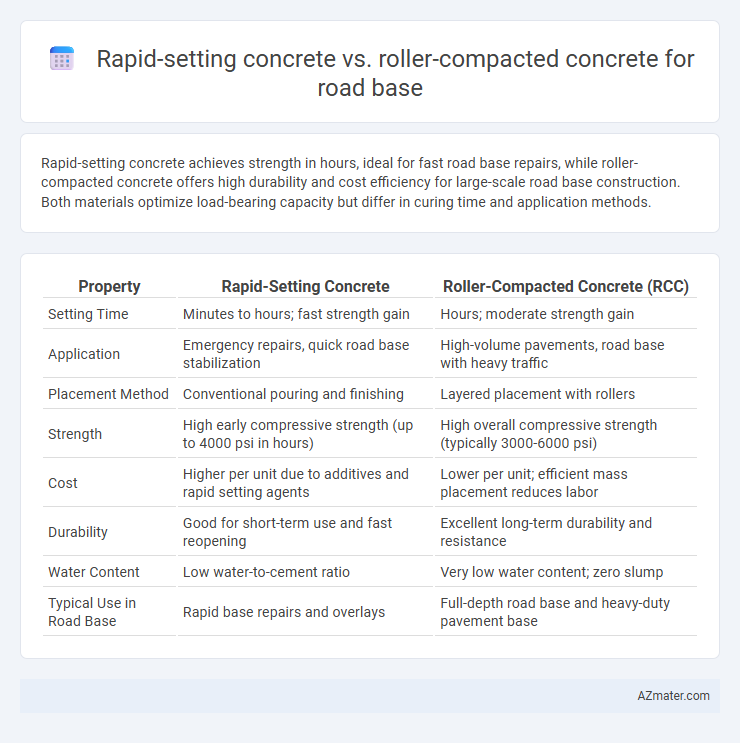Rapid-setting concrete achieves strength in hours, ideal for fast road base repairs, while roller-compacted concrete offers high durability and cost efficiency for large-scale road base construction. Both materials optimize load-bearing capacity but differ in curing time and application methods.
Table of Comparison
| Property | Rapid-Setting Concrete | Roller-Compacted Concrete (RCC) |
|---|---|---|
| Setting Time | Minutes to hours; fast strength gain | Hours; moderate strength gain |
| Application | Emergency repairs, quick road base stabilization | High-volume pavements, road base with heavy traffic |
| Placement Method | Conventional pouring and finishing | Layered placement with rollers |
| Strength | High early compressive strength (up to 4000 psi in hours) | High overall compressive strength (typically 3000-6000 psi) |
| Cost | Higher per unit due to additives and rapid setting agents | Lower per unit; efficient mass placement reduces labor |
| Durability | Good for short-term use and fast reopening | Excellent long-term durability and resistance |
| Water Content | Low water-to-cement ratio | Very low water content; zero slump |
| Typical Use in Road Base | Rapid base repairs and overlays | Full-depth road base and heavy-duty pavement base |
Introduction to Road Base Concrete Solutions
Rapid-setting concrete offers accelerated strength gain ideal for urgent road base repairs and minimizes downtime, while roller-compacted concrete (RCC) provides a durable, cost-effective solution with high compressive strength and efficient placement for extensive road base construction. Both materials enhance load-bearing capacity and durability but differ in curing times, installation methods, and suitability depending on project scale and traffic demands. Selecting between rapid-setting and RCC depends on project timelines, budget constraints, and expected traffic loads to optimize road base performance.
Overview of Rapid-Setting Concrete
Rapid-setting concrete features accelerated curing times, allowing road base construction to be completed faster and reducing traffic disruptions. It achieves high early strength through specialized cement blends and admixtures, making it ideal for urgent repairs or projects requiring quick turnaround. This type of concrete offers enhanced durability and resistance to environmental stresses, ensuring long-lasting road base performance.
Key Features of Roller-Compacted Concrete
Roller-compacted concrete (RCC) for road base features a stiff, zero-slump consistency enabling fast compaction with heavy rollers, providing high density and strength comparable to conventional concrete. RCC incorporates a lower cement content and less water, reducing drying shrinkage and minimizing cracking potential, which enhances durability under traffic loads. Its rapid construction capability and cost-effectiveness make RCC a preferred choice over rapid-setting concrete in large-scale paving and road base applications.
Strength and Durability Comparisons
Rapid-setting concrete achieves high early strength within hours, enabling faster construction schedules, whereas roller-compacted concrete (RCC) develops strength more gradually but attains comparable long-term durability. RCC offers superior resistance to rutting and fatigue due to its dense, low-slump mix and compaction method, making it ideal for heavy traffic loads. Both materials provide durable road bases, but rapid-setting concrete is preferable for time-sensitive projects, while RCC excels in structural performance and longevity under continuous traffic stress.
Construction Speed: Rapid-Setting vs Roller-Compacted
Rapid-setting concrete offers significantly faster curing times, often reaching sufficient strength for traffic within hours, making it ideal for urgent road base repairs and projects requiring minimal downtime. Roller-compacted concrete, while robust and cost-effective, requires longer curing periods typically ranging from 24 to 72 hours before full compaction and traffic loads can be applied. Construction speed with rapid-setting concrete reduces project duration and traffic disruption, whereas roller-compacted concrete favors large-scale applications with moderate time constraints.
Cost Analysis for Road Infrastructure Projects
Rapid-setting concrete offers higher material costs compared to Roller-compacted concrete (RCC), but its fast curing properties significantly reduce labor and equipment rental expenses in road infrastructure projects. RCC provides a more economical solution for large-scale road base construction by utilizing lower cement content and simpler placement techniques, resulting in reduced overall project expenditure. Cost analysis reveals that while rapid-setting concrete enables quicker project turnaround, RCC offers better value in long-term infrastructure applications due to lower initial and maintenance costs.
Environmental Impact and Sustainability
Rapid-setting concrete significantly reduces curing time and energy consumption during road base construction, lowering carbon emissions compared to traditional concrete mixes. Roller-compacted concrete (RCC) offers enhanced durability with lower cement content, resulting in decreased greenhouse gas emissions and reduced raw material extraction. Both materials contribute to sustainable infrastructure by minimizing construction waste and extending road lifespan, but RCC's mechanical compaction and formulation promote better environmental performance in large-scale projects.
Maintenance and Longevity Considerations
Rapid-setting concrete offers faster curing times, enabling quicker road base stabilization and reduced downtime, but may require more frequent maintenance due to potential susceptibility to early-age shrinkage and cracking. Roller-compacted concrete (RCC) provides enhanced durability and low permeability, resulting in superior longevity and reduced maintenance needs for road bases subjected to heavy traffic loads. Choosing between rapid-setting concrete and RCC depends on balancing the urgency of project completion against long-term maintenance costs and performance expectations.
Best Use Cases: Selecting the Right Concrete Type
Rapid-setting concrete excels in emergency road base repairs and fast-track construction projects due to its quick curing time, enabling early traffic loading within hours. Roller-compacted concrete is ideal for large-scale road base applications requiring high durability and cost-efficiency, as it combines the strength of conventional concrete with rapid placement using asphalt paving equipment. Choosing the right type depends on project urgency, scale, load requirements, and budget constraints to optimize road performance and lifespan.
Conclusion: Choosing the Optimal Road Base Material
Rapid-setting concrete offers accelerated curing times, enabling faster construction schedules and early load-bearing capacity, ideal for urgent repairs or high-traffic roads. Roller-compacted concrete (RCC) provides cost-effective, durable performance with high compressive strength and superior resistance to deformation, well-suited for large-scale pavement projects. Selecting the optimal road base material depends on project timelines, budget constraints, and desired long-term durability, where rapid-setting concrete excels in speed and RCC in economical, robust infrastructural applications.

Infographic: Rapid-setting concrete vs Roller-compacted concrete for Road base
 azmater.com
azmater.com